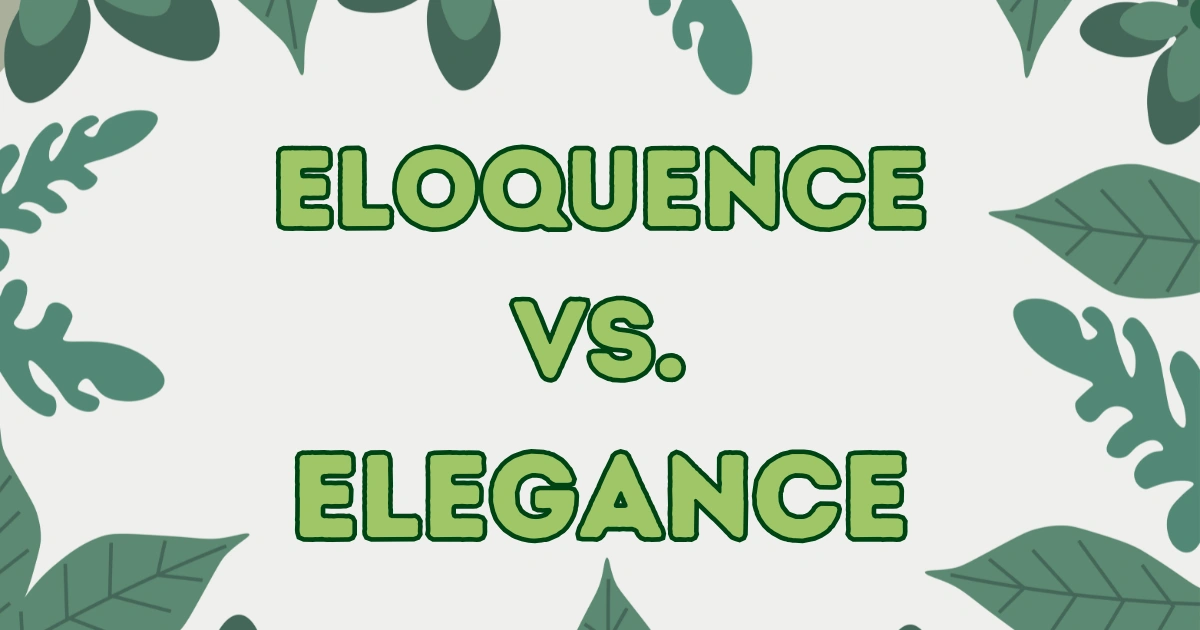Have you ever heard someone described as “eloquent” or “elegant”? Maybe you’ve even used these words yourself! They both sound nice and seem to describe someone impressive, right? But did you know that eloquence and elegance actually mean different things?
It’s easy to get them confused because they both have to do with being skillful and graceful. However, eloquence is all about using language well, while elegance is about being graceful and stylish in appearance or movement. Think of it this way: a great speaker is eloquent, and a beautiful dancer is elegant.
Understanding the difference between eloquence and elegance can help you use these words correctly and appreciate the unique qualities they describe. In this article, we’ll take a closer look at each word, explore their meanings, and see how they show up in different situations.
What is Eloquence?
Eloquence is the ability to express yourself clearly and persuasively using language. Someone who is eloquent can speak or write in a way that is both fluent and impactful. They capture your attention and make you want to listen.
Characteristics of Eloquent Communication
- Fluency: Eloquent speakers express themselves smoothly and effortlessly.
- Clarity: They communicate their ideas in a way that is easy to understand.
- Persuasiveness: They can convince others of their point of view.
- Vividness: They use language to create strong images and emotions in the listener’s mind.
Examples of Eloquence
Think of Martin Luther King Jr.’s “I Have a Dream” speech. His words were powerful, moving, and inspiring. That’s eloquence in action! You can also find eloquence in written form. A well-written novel that captures your imagination and keeps you hooked until the end is an example of eloquent writing.
What is Elegance?
Elegance is about refined grace and stylishness. It can refer to a person’s appearance, their movements, or even their behavior. Someone who is elegant carries themselves with poise and sophistication.
Qualities Associated with Elegance
- Gracefulness: Elegant people move with fluidity and ease.
- Refinement: They have a polished and sophisticated manner.
- Simplicity: Elegance is often associated with a minimalist and understated style.
- Timelessness: True elegance transcends trends and fads.
Examples of Elegance
Imagine a ballerina gliding across the stage with effortless grace. That’s elegance! A beautifully designed dress that is simple yet stunning is another example of elegance. Even a person who handles a difficult situation with calm and composure can be described as elegant.
Eloquence and Elegance: Major Differences
While both eloquence and elegance are admirable qualities, they are distinct from each other. Eloquence focuses on the power of language, while elegance focuses on refined style and grace.
| Feature | Eloquence | Elegance |
|---|---|---|
| Definition | Skillful use of language | Graceful and stylish appearance or behavior |
| Focus | Communication | Aesthetics and movement |
| Examples | A powerful speech, a well-written poem | A graceful dancer, a stylish outfit |
| Impact | Inspires, persuades, informs | Creates a sense of beauty and refinement |
Further Distinctions Between Eloquence and Elegance
To further understand the difference between eloquence and elegance, let’s consider how they might manifest in different contexts.
| Context | Eloquence | Elegance |
|---|---|---|
| Public Speaking | A speaker who delivers a captivating and persuasive presentation | A speaker who presents themselves with poise and confidence |
| Writing | A writer who uses language to create vivid imagery and evoke emotions | A writer whose prose is clear, concise, and stylish |
| Fashion | A fashion designer who can articulate their vision with passion and clarity | A fashion designer who creates clothes that are beautiful, timeless, and well-crafted |
| Social Interactions | A person who can converse with wit and charm | A person who behaves with grace and good manners |
Conclusion
Eloquence and elegance are both valuable qualities that can enhance our personal and professional lives. While they are often used interchangeably, it’s important to recognize their distinct meanings.
Eloquence is the art of using language effectively, while elegance is the quality of being graceful and stylish in appearance or behavior.
By understanding the difference between these two concepts, we can appreciate the unique ways they contribute to human expression and interaction.
FAQs
Some of the frequently inquired questions regarding the differences between eloquence and elegance are as follow:
Can someone be both eloquent and elegant?
Absolutely! These qualities are not mutually exclusive. Someone can be a graceful speaker with a refined sense of style, embodying both eloquence and elegance.
Is eloquence more important than elegance?
The importance of each quality depends on the context. In situations where communication is key, such as public speaking or writing, eloquence might be more valuable. In situations where appearance and behavior are important, such as a formal event or a job interview, elegance might be more crucial.
How can I improve my eloquence?
You can improve your eloquence by reading widely, practicing public speaking, and paying attention to the language used by effective communicators.
How can I cultivate elegance?
Cultivating elegance involves developing good posture, refining your manners, and choosing clothing and accessories that flatter your figure and reflect your personal style.
Are eloquence and elegance innate qualities, or can they be learned?
While some people may have a natural inclination towards eloquence or elegance, both qualities can be developed and refined through practice and conscious effort.
